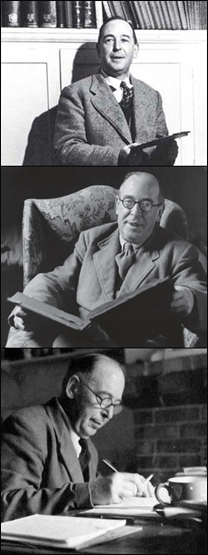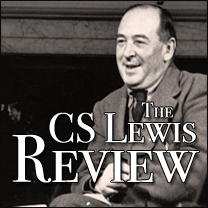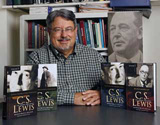
Recent Books on C S Lewis
July 27th, 2007 | Skip to comments
 Iam pleased to feature here some short reviews of some very excellent books (and an important journal publication) that have come out this Spring and Summer. Let me disclose here that I was privileged to read each of the books cited below in manuscript, and, when asked, offered a highly enthusiastic “recommend for publication” to their respective publishers. That is only to say that I want you to realize the positive things I think they contribute to Lewis Studies are genuinely felt. What makes it all the more joyful is that these are friends and colleagues who have taught me much about Lewis, and how to write about him.
Iam pleased to feature here some short reviews of some very excellent books (and an important journal publication) that have come out this Spring and Summer. Let me disclose here that I was privileged to read each of the books cited below in manuscript, and, when asked, offered a highly enthusiastic “recommend for publication” to their respective publishers. That is only to say that I want you to realize the positive things I think they contribute to Lewis Studies are genuinely felt. What makes it all the more joyful is that these are friends and colleagues who have taught me much about Lewis, and how to write about him.
The Company They Keep: C.S. Lewis and J.R.R. Tolkien as Writers in Community by Diana Pavlac Glyer
The best book on Lewis since David Downing’s Most Reluctant Convert is Diana Pavlac Glyer’s engaging and comprehensive study of that formidable writers group known as the Inklings. As I said in the blurb I created for the dust jacket: “The Company They Keep is an astonishingly thorough work, lucidly and boldly illuminating the collaborative writing processes of C. S. Lewis and J. R. R. Tolkien and their colleagues during the most fruitful period of their careers. Diana Glyer’s impressive achievement immediately supersedes in scope and authority all previous treatments of the Inklings in extant biographies and encyclopedia.” And I can add that the impressive documentation featured throughout is complemented by the stirring annotated bibliography provided by David Bratman, components that only increase the value of this amazing work that should be in every library, and on the shelf of every Lewis enthusiast. Diana’s careful biocritical research gives us uncommon insight into the effects of Lewis, Tolkien, Barfield, and Williams on each’s other in-progress manuscripts, and serves as a corrective to many hastily arrived at conclusions drawn by previous commentaries following Humphrey Carpenter’s lead. This volume so surpasses in wisdom and cogency the late Humphrey Carpenter’s The Inklings, I would urge you to sell your copy back to the used bookstore from whence it may have come, take the proceeds, and buy this one. It is a model of responsive, responsible, lucidly written scholarly work worthy of Lewis’s own high standards. It both educates and entertains. Selah.
Teaching C. S. Lewis by Richard A. Hill and Lyle Smith.
Several years ago, I had the pleasure of meeting Rick Hill, then of Taylor University, at a speaking engagement in Anderson, IN, and since then we have had many an opportunity to explore Lewisian topics in workshops and seminars together. Rick’s work with the Frances White Eubank Inklings Colloquium at Taylor is well-known and much admired, though he is now at Point Loma Nazarene University, outside of San Diego. At one point in the distant past, Rick, Lyle Smith of Biola University, and I had dreamed up the topic of a how-to book specifically aimed at “teaching C. S. Lewis.” It was a great idea then, but we all got caught up in other projects, publishers ebbs and flowed in their attention to it, and it was Rick and Lyle’s energy and focus that kept the original vision afloat. The result of their labor is a very fine, compact volume that will help Sunday School teachers, novice and advanced readers, pastors, and campus faculty to plan and teach C. S. Lewis courses in their respective venues. Its value is in offering insight in how to teach and engage varied audiences interested in Lewis’s fiction and apologetics. Questions and assignments accompany each chapter focused on a single work of Lewis’s. Owning this book is like having Rick and Lyle offer a seminar in your living room, church, or campus community. I felt privileged to be asked to contribute the book’s preface.
 C. S. Lewis by David G. Clark.
C. S. Lewis by David G. Clark.
David Clark, Professor of NT and Greek at Vanguard University and senior editor of The Lamppost for the Southern California C. S. Lewis Society, has given us a very winsome book—nicely poised between a comprehensive introduction for the reader new to Lewis and a holistic treatment of the varied literary output in the Lewis canon for Lewis admirers who may never have seen the forest along with the trees. David’s purpose is readily achieved: he has illuminated both Lewis’s use of Scripture in his literary and critical work, and the role Scripture played in Lewis’s own thinking, imagination, and theological conviction.
David writes with confidence and reflects his broad and knowledgeable acquaintance with Lewis’s wide span of works and key concepts. No mean feat. The tone and approach are collegial and consistently respect both the reader’s intelligence and likely expectations. In this, he replicates Lewis’s own tactics and demonstrates that Lewis has been an able mentor to him.
The chief contribution of this work lies in his steady treatment of Lewis’s use of Scripture and the Scriptural basis of his own imaginative works. David opens up the trails, proceeds illustratively though not exhaustively, through them, leaving the reader to follow up with as much depth as he or she wishes in pursuit. In the end, this work walks the tightrope between saying too much and saying just enough from the perspective of a Biblical scholar who also well understands the nature of narrative and why Lewis wrote as he did. Very good for individual or group study.
The Christian Scholars Review, Summer 07, “C S Lewis and Gender”
Don King is one of our finest and most original Lewis scholars, and, as editor of Christian Scholars Review, he continues to foster insight and enjoin courage in exploring topics of interest and controversy among Christian academics. 
The latest, Summer 07, issue of CSR, probes “C S Lewis and Gender,” and features two primary essays, one by Mary Stewart Van Leeuwen, “A Sword Between the Sexes: C. S. Lewis’s Long Journey to Gender Equality”; and one by Adam Barkman, “‘All is Righteousness and there is no Equality’: C. S. Lewis on Gender and Justice.” In addition to these, there are reactions from other veteran Lewis commentators, including Doris T. Myer and Joe Christopher. Prof. Van Leeuwen argues that Lewis’s view of gender evolves, and is greatly influenced by his relationship with and marriage to Joy Davidman Gresham. Prof. Barkman counters that Lewis maintains his “hierarchical” view of men and women throughout his career, and perhaps would be somewhat befuddled by our rehabilitative attempts in the 21st Century. To my mind, the best reading in the whole issue is ultimately Diana Pavlac Glyer’s closely reasoned response, “’We are All Fallen Creatures and All Very Hard to Live With’: Some Thoughts on Lewis and Gender.” Diana’s charitable tone and exhaustive contextual knowledge of Lewis’s life and times help us shape a responsible and informed—as well as candid and courteous—view of the topics discussed.





Comments
No comments yet.
RSS feed for comments on this post.
Sorry, the comment form is closed at this time.